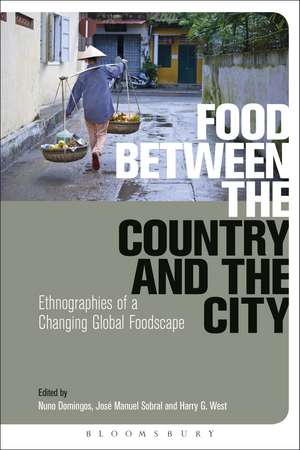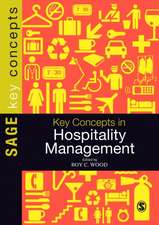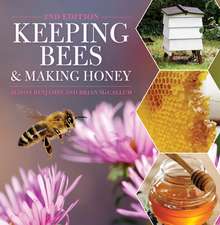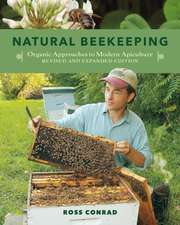Food Between the Country and the City: Ethnographies of a Changing Global Foodscape
Editat de Nuno Domingos, José Manuel Sobral, Harry G. Westen Limba Engleză Paperback – 26 mar 2014
Preț: 251.83 lei
Preț vechi: 288.33 lei
-13% Nou
Puncte Express: 378
Preț estimativ în valută:
48.19€ • 50.45$ • 39.87£
48.19€ • 50.45$ • 39.87£
Carte tipărită la comandă
Livrare economică 05-19 aprilie
Preluare comenzi: 021 569.72.76
Specificații
ISBN-13: 9780857855381
ISBN-10: 0857855387
Pagini: 264
Ilustrații: 7 bw illus
Dimensiuni: 156 x 234 x 15 mm
Greutate: 0.41 kg
Editura: Bloomsbury Publishing
Colecția Bloomsbury Academic
Locul publicării:London, United Kingdom
ISBN-10: 0857855387
Pagini: 264
Ilustrații: 7 bw illus
Dimensiuni: 156 x 234 x 15 mm
Greutate: 0.41 kg
Editura: Bloomsbury Publishing
Colecția Bloomsbury Academic
Locul publicării:London, United Kingdom
Caracteristici
Includes a wide range of ethnographic contexts including Global South, US, Europe, Africa, Middle East and Asia
Notă biografică
Nuno Domingos is a Post-Doctoral Research Fellow at the Instituto de Ciências Sociais, Universidade de Lisboa, Portugal, and a Research Associate of the Food Studies Centre, SOAS, University of London, UK.José Manuel Sobral is Senior Researcher and Director of the PhD Program in Social Anthropology at the Instituto de Ciências Sociais, Universidade de Lisboa, Portugal. Harry G. West is Professor of Anthropology, and Chair of the Food Studies Centre, at SOAS, University of London, UK.
Cuprins
List of IllustrationsAcknowledgmentsContributorsIntroduction: Approaching Food and Foodways Between the Country and the City Through the Work of Raymond WilliamsNuno Domingos and José Manuel Sobral, both Instituto de Ciências Sociais, Universidade de Lisboa, Portugal, and Harry G. West, SOAS, University of London, UKSection I: Of the Country and Its FoodConflicting Wine Narratives: 'Pleasing Prospects' and the Struggles in the Construction of AlentejoNuno Domingos, Instituto de Ciências Sociais, Universidade de Lisboa, PortugalEmbodying Country-City Relations: the Chola Cuencana in Highland EcuadorEmma-Jayne Abbots, University of Wales Trinity Saint David, UKBringing the City to the Country: Supermarket Expansion, Food Practices and Aesthetics in Rural South AfricaElizabeth Hull, SOAS, University of London, UKBringing It All Back Home: Reconnecting the Country and the City through Heritage Food Tourism in the French AuvergneHarry G. West, SOAS, University of London, UKSection II: Of the City and Its FoodComing to Terms with Urban Agriculture: a Self-CritiqueLaura B. Delind, Michigan State University, USAUrban Hunger and the Home Village: How Lilongwe's Migrant Poor Stay Food SecureJohan Pottier, SOAS, University of London, UKPerceptions of the Country through the Migration of City-grown Crops: Guinean Food in Bissau and in LisbonMaria Abranches, University of Sussex, UKSection III: Of the Nation and Its FoodThe Country, the Nation and the Region in Representations of Portuguese Food and CuisineJosé Manuel Sobral, Instituto de Ciências Sociais, Universidade de Lisboa, PortugalHazz al-Quhuf: An Urban Satire on Peasant Life and Food from Seventeenth-century EgyptSami Zubaida, Birkbeck and SOAS, University of London, UKReflecting Authenticity: 'Grandmother's Yogurt' between Bulgaria and JapanMaria Yotova, University of Shiga Prefecture, JapanUnpacking the Mediterranean Diet: Agriculture, Food, and HealthMonica Truninger and Dulce Freire, both Instituto de Ciências Sociais, Universidade de Lisboa, PortugalNotesReferencesIndex
Recenzii
One of my take-to-the-desert-island favorite books ... The editors of this current volume extend Williams' insights into tropes of the country and the city to the problem of food in the contemporary era ... [and] treat us to several fascinating examples of the tenacity of these tropes in the messy and dynamic material realities of contemporary food production, circulation, and consumption.
This book deals with an historical dichotomy (rural versus urban) that colors almost every discussion of food and diet: Is the city the only true site of gourmet indulgence? Does the romanticization of country food hide the decline of rural life? Is food tourism a form of social exploitation? This collection explores such issues in the context of supermarkets, heritage movements, urban food movements, and the globalization of the Mediterranean diet. This is the "new" ethnography at its best.
With its focus on examining the relationships between and problematizing the tropes of 'city' and 'rural' through the lens of food, this volume makes a valuable contribution to the emerging discipline of critical food studies. It consolidates emerging strands of research in interesting and useful ways by bringing together at once seemingly disparate themes and interrogating them through lenses of city and country. The collection is empirically rich and diverse and speaks to a range of interests, topics and perspectives. The ways that issues of city and country are tacitly explicated within the work of individual contributors is fantastic, and the ways in which they are woven together transforms them into a superb collection.
For too long tropes of the city vs. countryside and the values associated with these categories have been taken for granted in food studies. This volume is important in unpacking those categories, examining how they are made, remade and contested in relationship to one another, and the ideological systems that inform how those categories are made in the first place. This is a very timely and necessary intervention in food studies literature.
Drawing on a series of telling examples, the authors highlight the value of a comparative, ethnographic perspective in exploring the complex interconnections between urban and rural foodways, past and present. The result is a fitting tribute to Raymond Williams' pioneering work, extending the geographical scope of his argument and using its intellectual power to challenge conventional stereotypes about the country and the city.
The volume is especially appropriate for those working in rural and urban studies and can easily be assigned for undergraduate and graduate level coursework [.] Individual chapters will be of interest to those with related regional and topic focuses, though the material is heavily weighted towards Portugal. And for those interested in Williams's work, the intrigue of this volume remains, in large part, due to the strength of his original insight. What the editors give readers, where perhaps many food anthologies fall short, is a comprehensive theoretical perspective from which to analyze the plethora of ways humans produce, consume, represent, and interpret contemporary foodways.
This book deals with an historical dichotomy (rural versus urban) that colors almost every discussion of food and diet: Is the city the only true site of gourmet indulgence? Does the romanticization of country food hide the decline of rural life? Is food tourism a form of social exploitation? This collection explores such issues in the context of supermarkets, heritage movements, urban food movements, and the globalization of the Mediterranean diet. This is the "new" ethnography at its best.
With its focus on examining the relationships between and problematizing the tropes of 'city' and 'rural' through the lens of food, this volume makes a valuable contribution to the emerging discipline of critical food studies. It consolidates emerging strands of research in interesting and useful ways by bringing together at once seemingly disparate themes and interrogating them through lenses of city and country. The collection is empirically rich and diverse and speaks to a range of interests, topics and perspectives. The ways that issues of city and country are tacitly explicated within the work of individual contributors is fantastic, and the ways in which they are woven together transforms them into a superb collection.
For too long tropes of the city vs. countryside and the values associated with these categories have been taken for granted in food studies. This volume is important in unpacking those categories, examining how they are made, remade and contested in relationship to one another, and the ideological systems that inform how those categories are made in the first place. This is a very timely and necessary intervention in food studies literature.
Drawing on a series of telling examples, the authors highlight the value of a comparative, ethnographic perspective in exploring the complex interconnections between urban and rural foodways, past and present. The result is a fitting tribute to Raymond Williams' pioneering work, extending the geographical scope of his argument and using its intellectual power to challenge conventional stereotypes about the country and the city.
The volume is especially appropriate for those working in rural and urban studies and can easily be assigned for undergraduate and graduate level coursework [.] Individual chapters will be of interest to those with related regional and topic focuses, though the material is heavily weighted towards Portugal. And for those interested in Williams's work, the intrigue of this volume remains, in large part, due to the strength of his original insight. What the editors give readers, where perhaps many food anthologies fall short, is a comprehensive theoretical perspective from which to analyze the plethora of ways humans produce, consume, represent, and interpret contemporary foodways.








